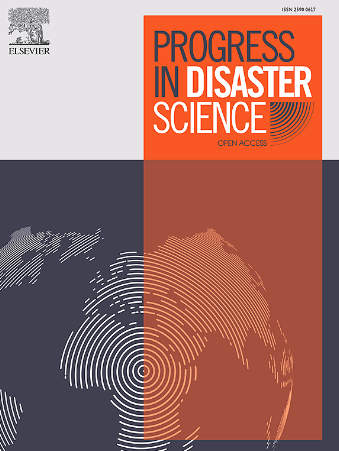The role of digital participation platforms in risk-informed development: A case study of Surabaya, Indonesia
IF 3.8
Q3 ENVIRONMENTAL SCIENCES
引用次数: 0
Abstract
There is growing policy consensus around the need for development to be risk-informed. In parallel, digital technologies are increasingly deployed to enhance participation within a wide range of policy domains, particularly in urban settings. While participation is considered essential to the timely and accurate identification and communication of risks with diverse stakeholders, the role of digital technologies with a participatory element in enabling risk-informed development is under-researched. This study identifies the factors that potentially enable digital participation platforms to contribute to risk-informed development based on an illustrative case study of Bulak District, Surabaya. Technology-related factors include the complementarity between digital platforms, citizen access to platforms, and aligned risk- and development -related policymaking and implementation processes. However, non-technological factors are equally, if not more, critical to digital participatory platforms' role in advancing risk-informed development. These include the risk awareness of participants, as well as the power relations that determine the design of such platforms and the ultimate translation into development planning of their outputs. Aligning regulatory frameworks for risk management and development, integrating digital tools at local and national levels, and improving the availability of disaster risk data are critical to digital participation platforms' role in promoting risk-informed development.
数字参与平台在风险知情发展中的作用:以印度尼西亚泗水为例
越来越多的政策共识是,发展需要了解风险。与此同时,数字技术被越来越多地用于促进广泛政策领域的参与,特别是在城市环境中。虽然参与被认为对于及时准确地识别风险并与不同利益攸关方沟通至关重要,但具有参与性因素的数字技术在实现风险知情发展方面的作用尚未得到充分研究。本研究通过对泗水Bulak区的一个说明性案例研究,确定了可能使数字参与平台有助于风险知情发展的因素。与技术相关的因素包括数字平台之间的互补性、公民对平台的访问以及与风险和发展相关的政策制定和实施过程的一致性。然而,非技术因素对于数字参与式平台在促进风险知情发展方面的作用同样至关重要。其中包括参与者的风险意识,以及决定这些平台设计的权力关系,以及最终将其产出转化为发展规划的权力关系。调整风险管理和发展的监管框架,在地方和国家层面整合数字工具,以及改善灾害风险数据的可用性,对于数字参与平台在促进风险知情发展方面的作用至关重要。
本文章由计算机程序翻译,如有差异,请以英文原文为准。
求助全文
约1分钟内获得全文
求助全文
来源期刊

Progress in Disaster Science
Social Sciences-Safety Research
CiteScore
14.60
自引率
3.20%
发文量
51
审稿时长
12 weeks
期刊介绍:
Progress in Disaster Science is a Gold Open Access journal focusing on integrating research and policy in disaster research, and publishes original research papers and invited viewpoint articles on disaster risk reduction; response; emergency management and recovery.
A key part of the Journal's Publication output will see key experts invited to assess and comment on the current trends in disaster research, as well as highlight key papers.
 求助内容:
求助内容: 应助结果提醒方式:
应助结果提醒方式:


